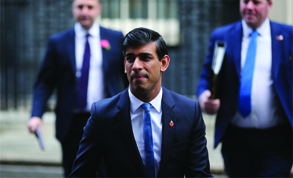NHS: spending review funding boost may not be enough
November’s spending review confirmed a £3bn NHS recovery package as part of £20bn to cover the Department of Health and Social Care’s broader Covid-19 costs.
The £3bn breaks down into £1bn to help address the elective backlog, £500m to reduce mental health waiting times and £1.5bn to ease existing Covid-related pressures. The remainder of the £20bn Covid funding will cover Test and Trace costs (£15bn), personal protective equipment (£2bn) and medicines (£163m).
The Department’s core revenue budget will increase to £147.1bn – a £6.6bn cash increase on the current year and representing an average 3.5% real-terms increase per year since 2019/20.
The core capital budget has been set at £9.4bn, which is £2.3bn more than pre-Covid times in 2019/20. This includes £4.2bn for NHS operational capital.
Within these departmental figures, the NHS England budget increases by £6.3bn to £136.1bn, with government reaffirming plans to increase the NHS England budget to £148.5bn in 2023/24. With the spending review covering just one year, there is no long-term capital settlement.
However, the government did commit to two multi-year programmes, with £3.7bn over four years to support the building of 40 new hospitals and £1.7bn for 70 hospital upgrades. Funding for both will come from core capital funding.
NHS Providers chief executive Chris Hopson welcomed the £3bn of new money, but said it was not clear if it would be enough.
‘It’s impossible to work out what the total additional funding needs associated with Covid-19 might be for next year,’ he said. ‘The government should therefore continue to honour its promise to give the NHS whatever it needs to continue to manage the impact of the pandemic.’
NHS Providers was also concerned that the budget for the hospital building programme would not cover all the hospitals announced. And the lack of a multi-year settlement for the broader department meant the NHS still didn’t have a fully funded long-term workforce plan.
HFMA director of policy and research Emma Knowles said that access to capital and approval of capital schemes was high on finance managers’ agenda. ‘The national hospital building programme and improvement scheme are welcome, but the detail of how other capital schemes, which are equally vital in their local areas, can be progressed on a timely basis is not yet clear,’ she said.
NHS Confederation chief executive Danny Mortimer described the settlement as a ‘Polyfilla budget’, leaving major cracks unfilled. He said that while the £3bn was good news, it fell far short of the £10bn estimated as necessary by the Health Foundation.
‘Political leaders will need to manage public expectations, as there is a very real risk to the quality of services that hardworking health and care staff are able to deliver,’ he said.
NHS England chief executive Simon Stevens said that NHS England had not been looking to reopen the multi-year revenue funding deal, but the pandemic had introduced new costs tied to Covid care. ‘We have had financial support for that through the course of this year and our agreement with government is that we will continue to do so going into next year.
‘Early in the new year, we will take stock of what the costs are likely to be. In the meantime, systems and trusts should continue to plan on the basis that they will sustain the capacity and staffing that they have available to them now.’
The chancellor highlighted a growing gap between public and private sector wages. In the private sector, wages had fallen by nearly 1% in the six months to September and it had also seen job losses, wage cuts and furlough. ‘In such a difficult context… I cannot justify a significant, across-the-board pay increase for all public sector workers,’ he said.
But NHS staff were not included in the pay freeze and there will also be a £250 increase for the lowest paid in the public sector. For the NHS, Mr Sunak said he would take advice from the pay review bodies, which will report next spring.
The NHS Confederation said it would be important to see the detail of how trusts will be expected to fund any pay rise. Mr Mortimer added that the £260m for Health Education England to support training and retention was ‘significantly below what is needed to address the longstanding workforce shortages’.
And according to Royal College of Nursing chief executive Donna Kinnair, the chancellor had ‘failed to act’ by not delivering an early and significant pay rise for nurses.
‘The level of pay rise that government agrees must reflect the true skills and value of nursing,’ she said. ‘For now, they continue to be worse off than 10 years ago.’ She added that those working in social care and the community also deserved an increase.
John Appleby, chief economist at the Nuffield Trust, underlined this point. ‘While promised increases in NHS pay are welcome, without a similar commitment for social care there is a real risk the vulnerable sector will see its much-needed workforce go elsewhere,’ he said.
Virtual reality
This year’s HFMA annual conference is an online event over two weeks, providing a 12-day festival of learning. Week one features online learning labs and concludes with a one-day student conference. The second week includes keynote addresses that explore HFMA president Caroline Clarke’s theme of Taking pride in our future. Delegates will receive daily email updates, or see news at www.hfma.org.uk/news/
Related content
We are excited to bring you a fun packed Eastern Branch Conference in 2025 over three days.
This event is for those that will benefit from an overview of costing in the NHS or those new to costing and will cover why we cost and the processes.